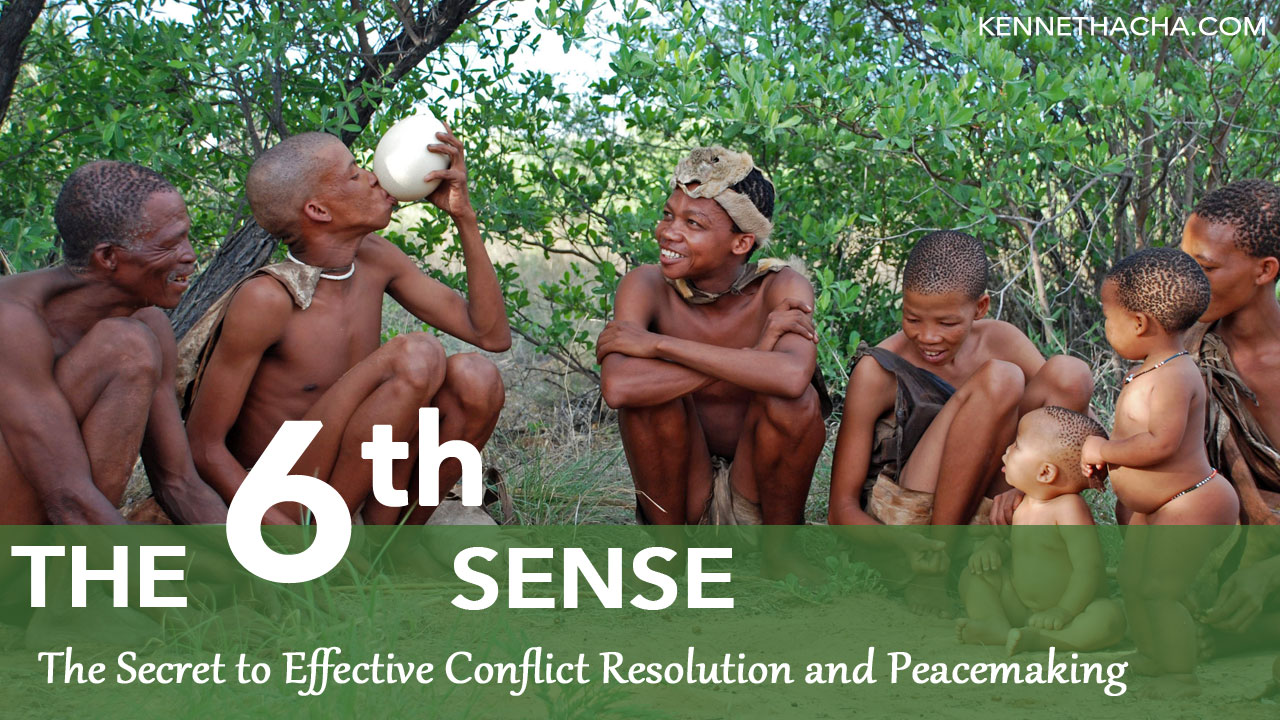During a conflict, the parties involved usually lose perspective and become defensive, reactive, and self-centered. As humans, we are emotional beings. We are quick to react. Our five senses – seeing, hearing, smelling, tasting, and touching – become biased by our own personal paradigms. We see and hear things only from our own point of view. Empathy goes out of the window. Instead of a win-win mode of negotiation, we resort to win-lose competition.
The consequence? Ambition begets ambition.
That’s where a community of people who care comes in and provides what I call the sixth sense. The sixth sense is the sense of reason that opens the eyes of the conflicting parties to see and think beyond themselves. It helps them realize that there is something bigger than themselves that they need to consider as they seek a resolution to the conflict. This increase in depth of perspective is crucial for effective conflict resolution.
With the sixth sense, we – the community – say that we are our brother’s keepers. We affirm that what happens between our brothers determines what we become as a society. We acknowledge that what happens within families, for example, determines the health of our community as a whole. It shows that we all have a stake in how all members of our community resolve their conflict. There is no such thing as their business and our business. We are all in it together. We are more connected and interdependent than any of us can imagine. The bond that binds us is stronger and closer than we think. Our destinies are interconnected. Our joy and success depend a lot on how everyone else around us is doing.
Bill Ury of the Harvard negotiation project tells the story of the San Bushmen of Southern Africa. They are indigenous hunter-gatherers and live like our ancestors lived for much of human history. All the men have very deadly poison arrows that they use for hunting. When conflict arises between members of the community and tempers rise, what they do is that someone goes and hides the poison arrows out in the bush. Then everyone sits around in a circle and they talk and talk. They sit there and talk it out until the conflict is resolved and often reconciliation is reached. They don’t rest until a resolution is found, even if they have to sit there and talk on and on for several days. If tempers are still too high after several days of failed talks, they send one of the parties off to visit relatives and cool off in the process. As an anthropologist, Ury believes that such a system is probably responsible for keeping the entire human race alive.
The sixth sense that the community provides helps those in a conflict realize what’s really at stake. It helps them see that for the sake of the kids, for the sake of the family, for the sake of the community, for the sake of the country, and for the sake of world peace, it’s best for them to seek peace and mend their relationships.
This sixth sense is often provided by a sub-community as in the case of the San Bushmen. If a conflict starts between members of a fraternity, the other members of the fraternity would be in a good position to provide the sixth sense. If it’s between members of a political party, professional group, family, religious or faith group, the other members of the respective groups would provide sixth sense.
Why do members of a subculture make the best option for providing the sixth sense? Because they share the same core values as those in conflict and have a good command of the issues at stake, especially the emotional and personal issues. Because they share the same core values and beliefs, trust is easier to build.
The sixth sense doesn’t only come from a community. For some people, it can come from God or a higher power. If two people who believe in a God who lives and speaks to them, they may choose to have their God be the source of their sixth sense, their voice of truth. Of course, they have to agree on what constitutes the voice of God, etc. But that’s a choice they have. And I know many spiritual people who choose to turn to their God for their sixth sense. Some religious people also look to their churches, synagogues, mosques and other fellowship groups to provide the sixth sense.
I think what matters most is not the channel through which people in conflict get the perspective of truth and wisdom that constitutes the sixth sense but the fact that they actually receive that truth. That truth, not the channel, helps with resolving the conflict and strengthening the relationships.
Action point
As a society, we are very resistant to others coming in and helping during a time of conflict. This is unfortunate because that’s when we can all benefit from an impartial community that cares enough to provide the crucial sixth sense.
But we can change our societies by changing ourselves. I encourage you to make a point to seek the sixth sense when you are in a conflict and to encourage others to do so. Also, be willing to become the sixth sense to others. Then watch as your relationships improve and your life is changed by a simple switch in your paradigm. In the process, you will make the world a better place.
